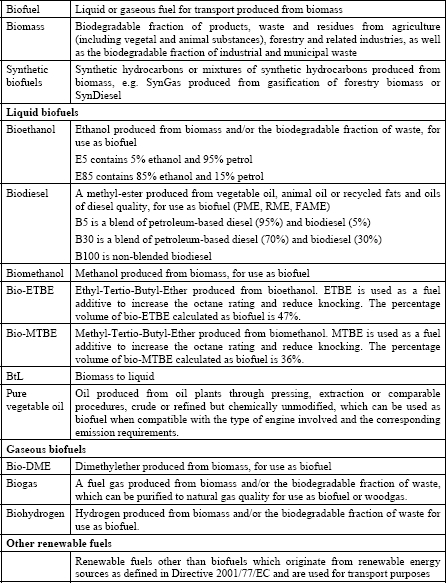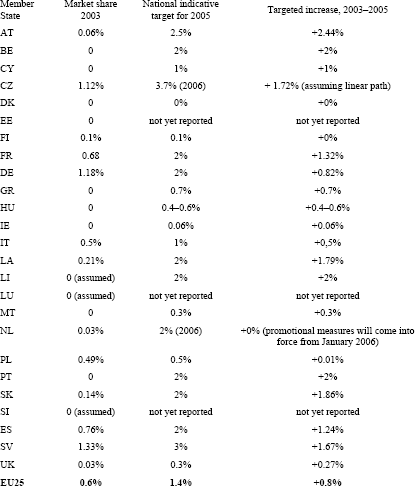|
 << Letze Seite Inhltsverzeichnis Nächste Seite >> << Letze Seite Inhltsverzeichnis Nächste Seite >>
DAS BIOKRAFTSTOFFPOTENZIAL AUSSCHoePFEN
EIN STRATEGISCHES KONZEPT
Biofuels Glossary

Biofuels: progress at national level

Policies Promoting Biofuels in non-EU countries
Rising oil prices, pressure to reduce CO2 emissions, and the desire to increase energy selfsufficiency,
conserve valuable foreign exchange and create employment are motivating
countries around the world to enact policy measures in support of biofuels.
Like the EU, a number of countries have set short- and long-term targets for the percentage
or quantity of biofuels to be incorporated into conventional fuel. In certain countries a
percentage blend is mandatory in all or part of the country. In Brazil, which has the world’s
most developed biofuels industry, a 25% blend is mandatory. Canada has a 3.5% target for the
incorporation of bioethanol by 2010 but has a mandatory level of 5% for Ontario, to be
achieved by .
A number of countries give tax credits or incentives to biofuel producers or feedstock
growers, and waive the excise and/or fuel tax, making the fuel cheaper to buy than
conventional petrol or diesel. In some cases government-owned vehicles are required to use
biofuels. From January 2006 India will introduce a biodiesel purchasing policy, obliging
public sector oil companies to buy oil produced from jatropha, pongamia and other oil plants
and sell it in a 5% blend, rising to 20% in 2020.
In Brazil and Thailand there are tax exemptions for vehicles able to run on biofuels.
Thailand is also supporting the development of domestically-produced “green” vehicles.
Many countries have grant and loan programmes for the construction of processing plants or
the development of feedstock. In Australia, seven new projects have recently received
Government backing.
Brazil’s example is best known and has served as inspiration for a number of other, mainly
sugar-producing, countries. Brazil has become the world’s largest producer and consumer of
ethanol, largely thanks to the targeted subsidies under the Proalcool programme.
The Proalcool programme was launched in 1975 as a response to the oil price shocks of
1973/74 and as a means to develop a use for surplus sugar production. It provided incentives
for ethanol producers, as well as price subsidies for consumers through tax reductions.
Initially, the programme was very successful: in 1986, 90% of all new cars sold ran solely on
ethanol, while ethanol production costs and prices gradually decreased due to economies of
scale and gains in yield.
In Brazil all petrol is still sold with an ethanol component of 20–26%. In economic terms,
investments in agriculture and industry for the production of transport ethanol in the period
1975–89 has been estimated at close to US$ 5 bn, triggering benefits in terms of import
savings with a value of over US$ 52 bn for the period 1975–2002. Although the programme
lost some of its impact in the 1990s due to a slump in world oil prices and the phasing-out of
government incentives, it is seeing a resurgence related to current high oil prices, the
competitiveness of ethanol as a transport fuel and the emergence of new export markets.
There are currently no subsidies for ethanol production and the product is very competitive on
the domestic market: hydrated ethanol is sold for 60–70% of the price of gasohol (a blend of
90% petrol and 10% ethanol) at the pump. The Brazilian government continues to pay close
attention to the biofuels sector, however, by encouraging the sugar cane industry and the
provision of “flexible-fuel” vehicles. In addition, new legislation on biodiesel was
implemented in January 2004.
The world’s second largest producer of bioethanol, the United States, has seen an exponential
rise in production initiatives over the last year thanks to a series of tax measures and
incentives.
In 2004 the Energy Tax Act was reworked and renamed the Volumetric Ethanol Excise Tax
Credit (VEETC), meaning that the tax exemption now applies to all levels of blending.
VEETC extended the existing ethanol tax incentive to the end of 2010 at a rate of $0.51 per
gallon. It also improved the “small ethanol producer tax credit”, which allows a 10 cent per
gallon tax credit for facilities with a capacity of less than 30 million gallons per year. VEETC
also introduced a tax credit of $1 per gallon for biodiesel if made from new oil or $0.50 per
gallon if made from recycled oil.
Other federal tax incentives include income tax deduction for alcohol-fuelled vehicles and an
alternative-fuels production tax credit. The American Jobs Creation Act of 2004 (Public Law
108-357) provides tax incentives for alcohol and biodiesel fuels, available to blenders/retailers
beginning in January 2005. The credits are $0.51 per gallon of ethanol at 190 proof or greater,
$1.00 per gallon of agri-biodiesel, and $0.50 per gallon of waste-grease biodiesel. If the fuel is
used in a mixture, the credit amounts to $0.05 per percentage point ethanol or agri-biodiesel
used or $0.01 per percentage point of waste-grease biodiesel.
In 2005, as part of its new energy bill, the United States introduced a “renewable fuels
standard” (RFS), with a target rising from 4 billion gallons in 2006 to 7.5 billion gallons by
2012. The industry is confident of meeting this target and expects eventually to achieve a 10%
market penetration.
A Bioethanol Bill, which would require the blending of bioethanol into commercial gasoline,
was recently approved by the House of Representatives. Under the bill, all commercial motor
fuels would be required to have a 5% blend of bioethanol within two years of the act coming
into force. After another two years, the required blend would go up to 10%.
<< Letze Seite Inhltsverzeichnis Nächste Seite >>

|